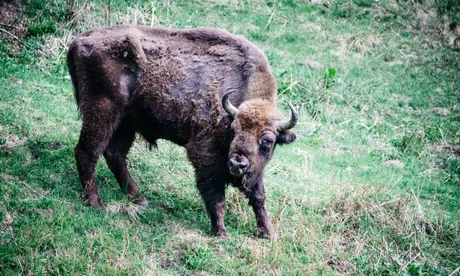A new research has found that a herd of 170 bison reintroduced to Romania’s Țarcu mountains could help store CO2 emissions equivalent to removing almost 2m cars from the road for a year, demonstrating how the animals help mitigate the worst effects of the climate crisis.
European bison disappeared from Romania more than 200 years ago, but Rewilding Europe and WWF Romania reintroduced the species to the southern Carpathian mountains in 2014. Since then, more than 100 bison have been given new homes in the Țarcu mountains, growing to more than 170 animals today, one of the largest free-roaming populations in Europe. The landscape holds the potential for 350-450 bison.
The latest research, which has not been peer-reviewed, used a new model developed by scientists at the Yale School of the Environment and funded by the Global Rewilding Alliance. It calculates the additional amount of atmospheric CO2 that wildlife species help to capture and store in soils through their interactions within ecosystems.
The European bison herd grazing in an area of nearly 50 sq km of grasslands within the wider Țarcu mountains, was found to potentially capture an additional 2m tonnes of carbon a year. That is nearly 9.8 times more than without the bison – although the report authors noted the 9.8 figure could be up to 55% higher or lower, given the uncertainty around the median estimate. This corresponds to the yearly CO2 emissions of 1.88m average US petrol cars.
Prof Oswald Schmitz of the Yale School of the Environment in Connecticut in the US, who was the lead author of the report, said: “Bison influence grassland and forest ecosystems by grazing grasslands evenly, recycling nutrients to fertilise the soil and all of its life, dispersing seeds to enrich the ecosystem, and compacting the soil to prevent stored carbon from being released.
“These creatures evolved for millions of years with grassland and forest ecosystems, and their removal, especially where grasslands have been ploughed up, has led to the release of vast amounts of carbon. Restoring these ecosystems can bring back balance, and ‘rewilded’ bison are some of the climate heroes that can help achieve this.”
Alexander Lees, a reader in biodiversity at Manchester Metropolitan University, who was not involved with the study, said it “makes a convincing case for European bison reintroduction as a nature-based climate solution – one with major biodiversity conservation co-benefits”.
Story was adapted from the Guardian.
